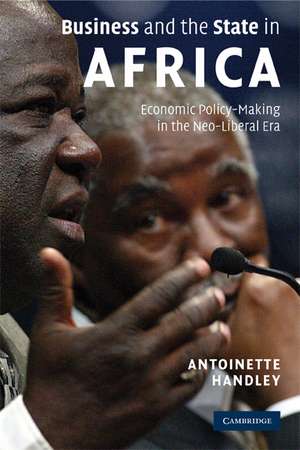Business and the State in Africa: Economic Policy-Making in the Neo-Liberal Era
Autor Antoinette Handleyen Limba Engleză Paperback – 25 iun 2008
| Toate formatele și edițiile | Preț | Express |
|---|---|---|
| Paperback (1) | 289.78 lei 6-8 săpt. | |
| Cambridge University Press – 25 iun 2008 | 289.78 lei 6-8 săpt. | |
| Hardback (1) | 697.14 lei 6-8 săpt. | |
| Cambridge University Press – 25 iun 2008 | 697.14 lei 6-8 săpt. |
Preț: 289.78 lei
Nou
Puncte Express: 435
Preț estimativ în valută:
55.46€ • 57.68$ • 45.78£
55.46€ • 57.68$ • 45.78£
Carte tipărită la comandă
Livrare economică 12-26 aprilie
Preluare comenzi: 021 569.72.76
Specificații
ISBN-13: 9780521713719
ISBN-10: 0521713714
Pagini: 304
Dimensiuni: 150 x 228 x 19 mm
Greutate: 0.5 kg
Ediția:New.
Editura: Cambridge University Press
Colecția Cambridge University Press
Locul publicării:Cambridge, United Kingdom
ISBN-10: 0521713714
Pagini: 304
Dimensiuni: 150 x 228 x 19 mm
Greutate: 0.5 kg
Ediția:New.
Editura: Cambridge University Press
Colecția Cambridge University Press
Locul publicării:Cambridge, United Kingdom
Cuprins
Introduction: the African business class and development; Part I. Institutionalizing Constructive Contestation: 1. Ethnicity, race, and the development of the South African business class, 1870–1989; 2. The neo-liberal era in South Africa: negotiating capitalist development; 3. Business and government in Mauritius: public hostility, private pragmatism; Part II. Business and the Neo-patrimonial State: 4. The emergence of neo-patrimonial business in Ghana, 1850–1989; 5. State-dominant reform: Ghana in the 1990s and 2000s; 6. Business and government in Zambia: too close for comfort; Conclusion: comparatively speaking: the business of economic policymaking.
Recenzii
'A very serious and illuminating piece of scholarship about a strangely ignored topic in Africa. Handley has a clear and compelling theoretical argument that is nicely grounded in the cross-regional literature about state-business relationships and development. Her four country case studies on Ghana, Zambia, Mauritius, and South Africa are well done and based on real on-the-ground research – rare these days and certainly for this topic and place. At the same time, these fine empirical chapters always keep the historical context clearly in focus. Given the efforts at reforming African economies since the 1980s, this topic is absolutely central to any discussion of Africa's future. A fine book that really plugs Africa into the ongoing cross-regional debates about development.' Thomas M. Callaghy, University of Pennsylvania
Notă biografică
Descriere
Analyses the capacity of the indigenous business community in Africa to shape economic policy.



















